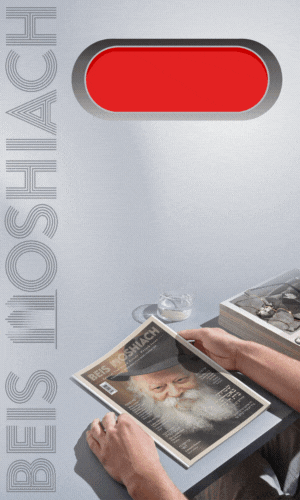For Your Shabbos Table: Joy Amidst Turmoil
From the desk of Rabbi Simon Jacobson, Director of the Meaningful Life Center: The first cardinal rule of every venture is defining its mission statement. Without a concise and clearly stated purpose, everything that follows will be scattered and confused. Goals will be hard to set, and success will be difficult if not impossible to measure. The mission aligns all the steps of the operation from start to finish – from concept to final product, from the strategies and plans, to the actions and goals. It brings together and coordinates the entire enterprise into one seamless unit • Click to Read
Dear Rabbi Jacobson,
I was very uplifted by your class, The Counterintuitive Secret to Happiness, as well as an older class The Secret of Finding Joy, which I viewed over the web (by the way, these classes are brilliant, one of the best kept secrets online; I tell everyone I know about them. You must find ways to distribute them widely). The way you explained the power of joy resonated deeply. Yet, I find it extremely difficult to implement these principles into my daily life. I was just laid off my job, my long-term savings have been depleted, to boot I grew up in a dysfunctional home, which I am always healing from, and there are many other factors in my life that are hardly a cause for happiness. Indeed, I feel as if I am perpetually sad, with a few sporadic spurts of short-lived joy bouncing up here and there. I often feel as though I have been hardwired without joy or happiness. Some people seem to be naturally cheerful. And some of us seem to be inherently despondent if not miserable.
Pray tell me that I am wrong.
Respectfully,
M.
——————————————————————————–
Dear M.,
Thank you for your kind, yet also sad words.
Let me get straight to the point. You are wrong. Very wrong.
Have you ever seen a newborn child sad? Every child ever born is always happy and joyful. Joy is hardwired in our hardware and in our software. Sadness is a superimposed state that we acquire once we being to grow and experience disappointment and duplicity. Children learn to be sad from their parents and the “mature” world that they become exposed to.
You may argue that children are naturally happy because they are naïve and have yet to witness “reality” – the harsh and cruel world in which we live, where people hurt each other and the many hardships that life presents us.
In truth, however, it is the other way around. A child is our most natural and quintessential state. The child’s innate cheer comes from an inner peace and contentment which results from a lack of dichotomy in the child’s life.
Seamlessness is the operative word. A child’s consciousness is not split into parts. A child is not torn between its needs and its behavior. We adults are constantly torn between demands upon us and our own needs, between what we truly want and what we must do to survive, between who we essentially are and what we do. Between the needs of our bodies and the needs of or souls. Who among us can say that our daily work and activities reflect our deepest inner aspirations? Is there a person that has no conflict of interest between a personal life and a professional one, between the demands of your job and those of your home and family? Has anyone not compromised some of their idealism and values due to the pressures of the struggle for survival?
When there is a split there is tension. And where there is tension there is sadness. A measure of angst is always healthy – to keep us reaching and growing. But when the angst spills over into anxiety, despondence and depression are not far behind.
Children are the most perfect model of seamlessness: A smooth flow between the inner and the outer; where identity meets expression. Imagine that your outer expressions were always reflecting your inner needs, and your deepest aspirations always had an outlet of expression.
It is only from adults that children learn to be sad. Yes, we adult project our feelings on our children and as they develop and enter maturity that too learn the world of envy ad greed, of selfishness and instant gratification, of struggling between what we know to be true and what we indulge in for our own pleasure.
You may then say, that all this is fine and good as long as we are children. But now that we have grown into adults, our childhoods lost, we no longer can access that inner contentment and happiness that is the domain of the child.
That may sound logical and… sad , but it is unequivocally wrong. The way we were born, the way we were hardwired always remains with us. Our inherent joy becomes concealed under many layers and veils, but it is embedded in our consciousness if not unconsciousness.
The question is how do we access it, especially once “paradise” has been seemingly lost? The answer goes back to the root of joy and happiness: Seamlessness. How does one achieve the seamless state, where there is no conflict between competing forces?
We can find our answer in an unlikely place – and one that is not even so popular today: Business.
The first cardinal rule of every venture is defining its mission statement. Without a concise and clearly stated purpose, everything that follows will be scattered and confused. Goals will be hard to set, and success will be difficult if not impossible to measure. The mission aligns all the steps of the operation from start to finish – from concept to final product, from the strategies and plans, to the actions and goals. It brings together and coordinates the entire enterprise into one seamless unit.
If so, you may ask, how is it that so many very focused businesses fail? Look around today, and we witness the collapse of numerous revered institutions, that had powerful mission statements and highly capable stewards at the helm. How did that happen? Read on.
So the secret of seamlessness – which lies behind the secret of happiness – is thus dependent on discovering the mission of our lives. Without that mission, our activities, involvements and investments – all our times and energy – will inevitably be unfocused, hence leading to tension and discord.
The mission of our lives is stated in the Torah portion called Terumah. In perhaps the shortest and most concise mission statement ever made, the verse states: V’osu li mikdash v’shochanti b’socham, Build Me a sanctuary and I will dwell among you.
Five words – V’osu li mikdash v’shochanti b’socham – define the purpose of existence and the mission and goal of each and every life: Take all the elements of your life, all your physical materials and material activities, direct all your faculties, gifts and opportunities toward one goal: Build Me a sanctuary and I will dwell among you.
Align all your energy and activities toward this one seamless goal, and you will find seamless happiness. It may be difficult to tackle every aspect of our lives, but we can always begin with aligning some areas toward the stated mission. You will find that joy is directly proportionate to the amount of focus of one’s life toward fulfilling the higher mission.
Just as staying true to your mission is the bedrock of personal success in the microcosm of our personal lives, the same is true in the macrocosm of our institutions, leaders and governments — many of which seem increasingly rudderless and often corrupt. Many failing entities have clearly strayed from their own missions and sound strategies. They take unsound risks, due to greed and other selfish incentives, or due to misplaced loyalties, obstinate positions and distorted politics (take today’s American President’s fear and hesitation in identifying Muslim militants), ultimately betraying the trust in them. Even if one were to argue that some remain true to their missions – which is not necessarily the case – many definitely did not live up to the larger mission of our entire system: Integrity. The only way that democracy and capitalism, which is driven by personal gain, can survive is through a fundamental trust (which incidentally is stated in many financial company’s mission statements: Investments you can trust, “securities,” take Prudential’s “rock”).
Similarly with the current threat of global terrorism: The only way to successfully wage war against Muslim aggression and their assault on our core values is by crystallizing our higher calling and recommitting to our global vision and mission founded on the unshakable sanctity of human dignity and individual freedoms.
It surprises me that with all of our best minds at work during the past few years trying to find a solution to our global and domestic challenges, no one has suggested revisiting the initial “mission statement” of the United States of America – the driving ethos that gave birth in the first place to this mighty nation and created the climate for its thriving growth. This would be especially welcome now, as we are in the midst of a new Presidential campaign, nominating the candidate who will be our next President.
In the Declaration of Independence – which one can say is the USA’s “mission statement” – the Founding Fathers, in their wisdom (and apparent study of the past failed systems and governments), understood that the key to this country’s success lies only if it stands on a solid bedrock, an unwavering foundation: “We hold these truths to be self-evident, that all men are created equal, that they are endowed by their Creator with certain unalienable rights, that among these are life, liberty and the pursuit of happiness. That to secure these rights, governments are instituted among men, deriving their just powers from the consent of the governed.”
They did not make economic prosperity or complacency the mission or goal of this country. Free commerce and financial success is a symptom, not a cause of freedom. They clearly knew that the driving mission of this country must be based on the absolute Divine equality endowed on all human beings. Governments are instituted to secure and protect the Divine unalienable rights of man, not the other way around. This is the only basis of trust, freedom and all the components necessary to allow for healthy relationships, personal motivation and successful businesses. Without faith, without accepting higher authority that gave us all the gift of life and liberty, what is there to protect one greedy man from another? What is there to protect innocent citizens from a zealot?
Socialism’s argument against capitalism was always that we cannot trust people driven by personal gain and greed. Thus the need for deprivatization, eliminating all private property and ownership. The problem with this approach is that by the same argument we also cannot trust the socialists and the ones taking charge of the socialist revolution (as history has proven only too well). In days of old, a few monarchs controlled capital, with the same argument, that left on their own people’s self-interests will destroy them. But could we trust the monarchs? One could argue perhaps, that less damage is possible if we isolate the abuse to a few people than to many. But a contrary argument can also be made.
Regardless, all these arguments make it absolutely clear and necessary that the only hope for our institutions to succeed is fundamental integrity and trust. You can create all the regulating you like – as if the SEC was doing its job – but without a deeper sense of faith and the feeling that we have to answer to a higher authority, no system could be trusted.
All our experts must do – all that the President must do – is look at the money in their own pockets. Engraved on every coin, etched on every bill, are the words “In God we trust.”
The only antidote for human greed –and for religious radicalism — is the acceptance, respect and obligation to a higher calling, which in turn allows for trust of each other.
Our leaders today ought to simply echo and reiterate this nation’s original mission statement – declaring the core base of our union is the Divine gift of life that we were all given equally, that “In God we trust” and with that trust “E Pluribus Unum,” from the many, one, and we can thus trust each other, and become one despite our diversity. That without this common bond our system – our government, economy, politics and all our institutions – cannot endure. Without answering to a higher calling and authority, we will end up in the same place as so many mighty empires before us: History.
Our leaders must declare that integrity is good for business. Greed may work short-term, but can never endure.
Of course, this alone will not solve our problems. We need to rebuild (or create new models for) our institutions and structures. But without this essential trust – without the foundation – the structure cannot stand.
Any economic turmoil and turbulence surrounding us presents a unique opportunity to revisit our “point of departure:” Our initial missions. Which in turn allows us to realign our lives accordingly.
My suggestion to you, M., is to begin asking yourself: “What is my mission? Why was my soul sent down to Earth?” Though this may not be a short-term solution, I assure you that if you are persistent in your search, in time you will find your calling, and as you do you will become a happier person. Remember, you have joy inside of your soul. As a newborn child it was active. Then it may have retreated as you faced various challenges. But the happiness it is still in there somewhere. Perhaps locked, perhaps trapped – but waiting for you to release it.
Connect your active life to a deeper mission, reintroduce seamlessness into your existence, and you will begin releasing the joy within you.
What better time to begin than in this joyous month of Adar? Celebrate, sing and dance with others, celebrate with people who are connecting to something higher than themselves. Celebrate the joy of Adar, joy which transcends and “pierces all boundaries,” to the point of Purim’s joy, which is called “ad d’lo yoda” – unbridled joy to the point beyond consciousness; the joy deeply embedded in the subconscious soul.
31
Join ChabadInfo's News Roundup and alerts for the HOTTEST Chabad news and updates!










































